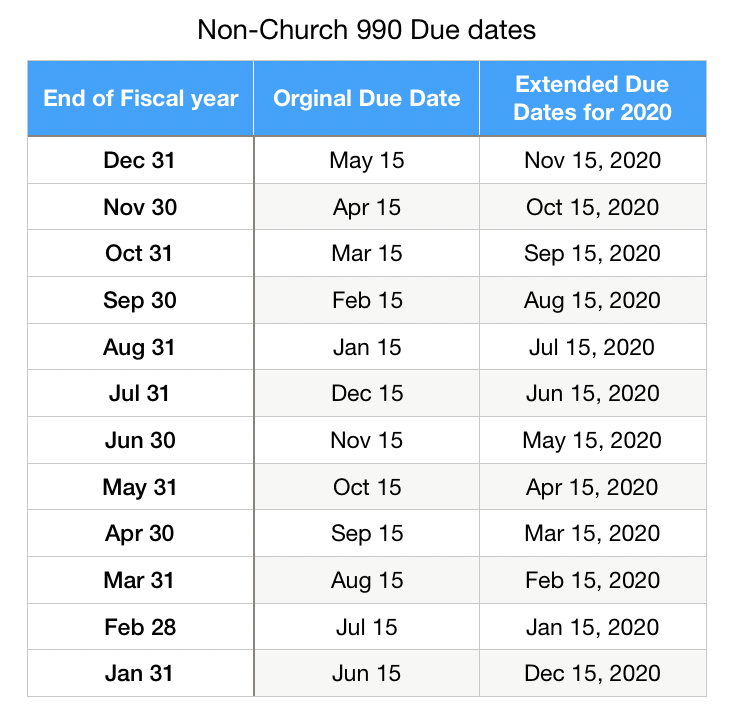Updated Tax Filing Dates Ministers Need to Know
By Amy Manderscheid

January of any new year has a reputation for many things: New Year’s resolutions, new goals, and a time to close out the past year and reflect on what you accomplished.
For business owners and ministry leaders, the start of the year also means it’s time to maintain your tax-exempt status, hold your annual board meeting, and provide your donors with their yearly donation reports for their tax returns.
I’m not sure about you, but in January of 2020, my greatest worries were about getting my tax documents together for my CPA to prepare my tax return for 2019. However, in early March, my concerns shifted to the health and safety of my family and community as our country began battling COVID-19. As the pandemic sent us into survival mode, many of our routine tasks, like filing taxes, fell to the wayside.
The government was quick to respond and to award extensions on filing deadlines for our taxes and other requirements to ease the burden of the impact of the coronavirus on American citizens.
I want to take a few minutes to ensure that you have the most up-to-date information about the upcoming filing dates, as they have changed many times. Tax time is confusing for everyone, but with these additional changes, it is easy to get sidetracked and miss a deadline. It's times like these that make having a partner like StartCHURCH invaluable for our pastors and ministry leaders.
Individual Tax Returns
On March 17, 2020, the IRS granted a 90-day extension to individual tax return filings, changing the filing day from April 15th to July 15th. On the new deadline of July 15th, the IRS will require you to file your returns for 2019 or file an extension. If the return or an extension is not filed on time, penalties and interest on the liability will likely begin to build up. Take note that this is true only regarding federal tax returns. State tax returns are a separate matter, and each state is determining their deadlines individually. If you are unaware of when your state tax returns are due, we encourage you to find out as soon as possible.
How do you keep up with all of the returns that have been adjusted due to COVID-19? Corporate estimated returns, individual tax returns, 941s, state returns, 990s, and 1040s—it’s just too much! Let me help you out. Below are a few tables that will provide you with the information you need.

If you missed any of these filing dates, go ahead and get those files completed by your tax professional. If you need help, please give us a call at 877-494-4655. We have an amazing team of CPAs that specialize in nonprofit and ministerial tax returns.
If you have not completed your 2019 tax return, please let us know how we can serve you before the July 15th deadline. Keep in mind that even if you are filing an extension for your 2019 return, your tax liability payment is still due.
File Your Taxes the Right Way
Click HereFederal Tax Extensions
The term 'income tax extensions' is a little misleading. Here's why:
MYTH: Most individuals believe that when they file an extension before Tax Day (April 15th most years, July 15th in 2020) that they have an automatic 6 months to complete their return and pay their taxes.
TRUTH: This is not the case. If you file an extension on any tax year and you owe money, the IRS does NOT grant an extension on paying that liability. You are still expected to send in a payment to the IRS by the due dates (April 15th most years, July 15th in 2020).
Filing an extension only extends the due date of the return, not your time to make a payment. If you wait to pay your liability until October, then late filing penalties may be assessed. The extension due date in 2020 for the tax year 2019 is still October 15th. It is NOT 6 months from July 15th.
State Income Tax Returns
For state tax returns, most states have adopted the July 15th extension except for a few. Colorado has granted a 6-month extension until October 15th, Hawaii has until July 20th, Idaho has extended until June 15th, Iowa has extended until July 31st, Mississippi only extended 30 days with the new due date of May 15th. Please continue to research your state tax database for any updated information.
990 Returns for Non-Church Entities
The IRS requires each non-church entity to file a return called a Form 990 each year. There are multiple 990 forms. Please reference our blog post, What Ministries Should Know About IRS Form 990, for more information about which form you need to file. Due to COVID-19, the IRS has extended the due dates for all Form 990s. Form 990 is typically due on the 15th day of the 15th month after the close of the fiscal year. We have added a table with the original filing dates and the newly extended filing dates below. If you need help with your Form 990, please let us know. Our team of CPAs would be happy to serve you!

Let Us File Your Form 990
Click HereCorporate Estimated Tax Payments
Corporations often have to make estimated tax payments if they expect to owe tax of $500 or more when their return is filed. These payments are typically due on the 15th day of the month after the end of the quarter (April 15th, July 15th, October 15th, and January 15th). For the first and second quarters of 2020, the IRS has extended the payment due dates to July 15th. The third and fourth quarters are due on their regular dates as of now.



Disclaimer: Please note that if your fiscal year differs from January to December, some of these due dates may not be accurate for your type of filing. This list also does not include ALL filings that may be due. Please refer to the IRS website or your state tax database for additional information. All of the dates listed are for the tax years 2019 and 2020. These dates will likely change in 2021.
We're Here to Help!
If you have questions or concerns about your taxes, give us a call at 770-638-3444, or click on the button below to have a specialist call you. We will be pleased to assist you!

